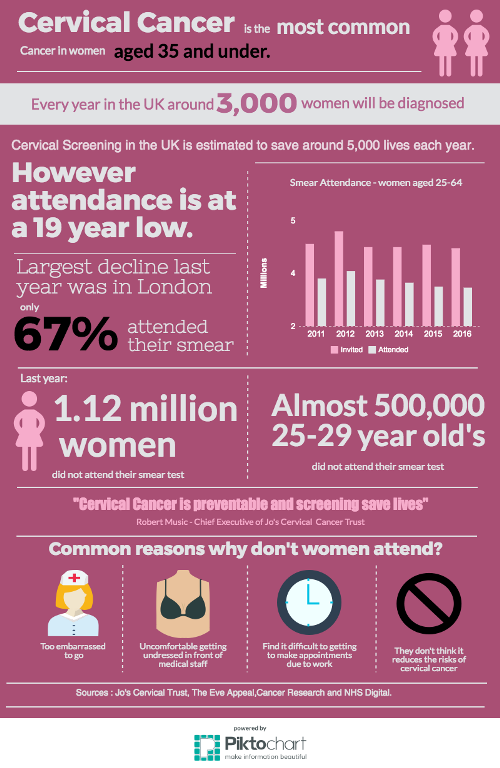Cervical cancer currently claims two lives every day in the UK and is the most common cancer in women aged 35 and under.
It is largely preventable, with this mainly due to the screening programme we have in the UK.
However awareness of the disease, and the need for cervical screening, is becoming ever more vital as 1 in 4 women are failing to attend when invited and attendance in England is at a 19 year low.
London saw the biggest decline in attendance last year, only 55% of 25-29 year olds attended, in some boroughs this dropped to as low as 46%.
This week is cervical screening awareness week, 12-18 June, and is a chance to encourage women to attend this potentially life-saving test.
Robert Music, Chief Executive of Jo’s Cervical Cancer Trust, said: “It’s estimated that screening saves around 5,000 lives every single year and since the programme was introduced we have seen a really positive drop in instances of mortality.
“But despite that we are now seeing numbers of women who are taking up the invitation go down quite significantly and is something we need to desperately turn around.”
Why is screening important?
Women receive a letter up to six months before their 25th birthday inviting them to attend cervical screening, also known as a smear test, and then every three years after that.
Robert explained that it is a very positive thing that cervical cancer is largely preventable and screening plays a really important part in that.
He said: “We cannot afford to see cervical screening attendance fall any further.
“Diagnoses of cervical cancer in the UK are worryingly high and will only increase if women don’t attend screening.”
Smears prevent up to 75% of cervical cancers from developing and it is important to note it is not a test for cancer.
Most tests will come back clear but some may detect abnormal cells or changes – these are not harmful in themselves but can prove useful in finding any changes early and preventing them becoming more serious.
Karen Hobbs, 27, was diagnosed with cervical cancer at just 24.
As she was suffering from bleeding she asked her GP for a smear but was just under the age of being automatically entitled to one.
Luckily for Karen the nurse agreed to do one and referred her straight to St George’s Hospital.
Subsequent tests revealed that it was cancer but it had been caught early enough to treat with a fertility saving operation.
She now talks about her experience to encourage other woman to get raise awareness and works at The Eve Appeal on the Ask Eve information service where women and men can ask anything gynaecologically related.

Although Karen’s cancer wasn’t picked up purely from a smear she urges women to take up the invitation.
She said: “You have to go because you might have abnormal cells that could turn into cervical cancer.
“You have to go because you need to look after your health and it’s amazing that cervical cancer is something that can be prevented.”
Talking about the embarrassment surrounding the test, she said: “It’s not nice but, those few minutes of being a bit embarrassed, it’s so worth the ‘argh’ than hearing you’ve got cancer.”
She added: “If you have any symptoms go and get checked out and when you’re invited for that smear test, we’re in a country where we are lucky enough to have a screening programme, take advantage of it and don’t worry about the embarrassment.”
Why don’t women go?
Jo’s Cervical Trust carried out research to understand why women don’t attend when invited and it found there were several reasons women don’t attend.
They found embarrassment is one of the main reason women do not attend their appointments.
Other reasons include feeling worried it will be painful, thinking it doesn’t reduce a woman’s risk of cervical cancer and fearing the results; thinking it’s a test to find cancer rather than prevent cancer.
Mika Simmons co-founder of the Gynaecological Cancer Fund, which supports research at the Royal Marsden, set up the Lady Garden Campaign to empower women to talk more opening without embarrassment about cancers such as cervical cancer.
She said: “Those of us who launched the Gynaecological Cancer Fund grew up with the generation of women who’s mothers changed the general public’s attitude to Breast Cancer. They campaigned fearlessly to make sure women didn’t feel embarrassed to go for a breast examination and spread the word about breast cancer symptoms and now two thirds of women survive breast cancer.
“That is our intention with Lady Garden and it is desperately needed.”
Since launching the campaign Mika explains they have had numerous women tell them that they have been inspired to ‘be brave enough’ to go for their smear test.
What is Cervical Cancer?
It develops in a woman’s cervix and often has no symptoms in its early stages which is why screening is so important.
In most cases it is caused by the human papillomavirus (HPV) which is spread by skin to skin sexual contact.
According to Jo’s Cervical Trust most people will be infected with some type of HPV in their lives but for the majority of women this will not result in cervical cancer.
Symptoms can include unusual bleeding or pain, discomfort during sex and an unpleasant smelling discharge.
For more information or support visit:
